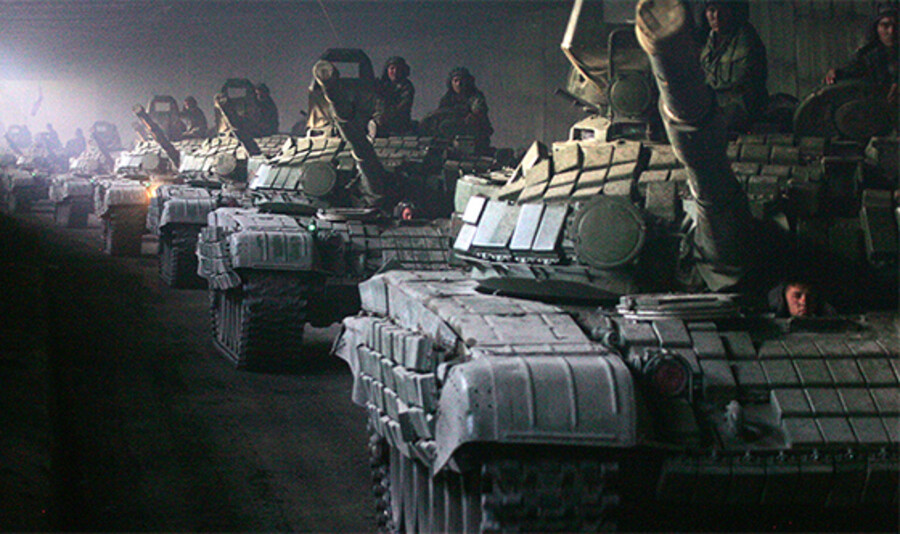
DMITRY KOSTYUKOV/AFP/Getty Images
Russia Quietly Takes Another Slice of Georgia’s Territory
Russian forces in the Republic of Georgia quietly pushed the occupational border deeper into the Tbilisi-controlled area this month, effectively expanding the size of the territory Moscow controls by dozens of acres.
The expansion occurred in the Bershueti village in the Gori district, according to a July 4 report by Georgia’s Agenda.ge news outlet. Russian troops erected a new border demarcation in the area that adds about 25 acres of Georgian territory to the Russia-controlled region of South Ossetia.
Georgia’s Ministry of Foreign Affairs issued a statement saying the move blocks several local farmers from accessing parts of their cultivated land: “This is a continuation of the illegal process of the so-called borderization, which not only restricts the fundamental rights of local residents but considerably damages the security situation on the ground and obstructs Georgia’s efforts to achieve peaceful resolution of the conflict.”
This is not the first time the Russians have pushed their de facto border deeper into Georgia. And Tbilisi-based analyst Irakli Bokuchava told the Trumpet on July 12 that if Georgia doesn’t stand up to Russia’s creeping occupation, Moscow will continue to take more land. “Non-resistance of Georgia only encourages Russia to steal more territories in South Ossetia,” he said. “The position of Georgia must be more severe.”
Georgian President Giorgi Margvelashvili said he will petition the international community to help Tbilisi halt Russia’s advance. “Georgia will use all diplomatic levers at its disposal to stop the creeping occupation,” he said.
Russia’s gradual push deeper into Georgia is only the latest move in President Vladimir Putin’s quest to reconstruct the Soviet empire.
Officially, South Ossetia is part of Georgia, a nation that was formerly part of the Soviet bloc. But in 1992, shortly after the collapse of the Soviet Union, the region declared independence from Tbilisi. For more than a decade, South Ossetia existed as a semiautonomous region that was mostly at peace with the rest of Georgia. But in 2004, the Georgian government launched efforts to regain control of the region, and conflicts between Georgian soldiers and South Ossetian separatists began to increase.
The tension culminated in 2008, when Georgia carried out a resolute ground and air assault on Tskhinvali, South Ossetia’s primary city. Putin responded to the offensive by invading Georgia and pushing Georgian soldiers out of South Ossetia and out of Abkhazia, Georgia’s other pro-Russian breakaway region.
After concluding the invasion, Moscow recognized the independence of both South Ossetia and Abkhazia. Putin then asserted control over the two regions, which together comprise one fifth of Georgia’s internationally recognized territory. A handful of Russia’s allies, including Venezuela and Nicaragua, followed Moscow’s lead in recognizing their independence.
Georgia, along with the United States and the European Union, labeled the Russian move a blatant and illegal land grab. Georgia continues to insist that both regions remain part of Georgian territory, and international law supports this view. But such claims mean little as Russia continues to assert more real-world control over South Ossetia and Abkhazia.
Russia’s push deeper into Georgia this month comes just 3½ years after Moscow annexed Ukraine’s Crimean Peninsula and during an ongoing conflict in which Russian forces are aiding separatists in eastern Ukraine. Both Ukraine and Georgia were part of the Soviet Union before its collapse. In 2005, Putin called that collapse “the greatest geopolitical disaster of the [20th] century.” This declaration provides insight into the Russian leader’s worldview and his overriding geopolitical goal: to reconstruct a Russian empire.
Many in Georgia, including Dr. Bokuchava, see that Russia’s push into South Ossetia parallels its recent actions in Ukraine. “Russia, in a way, is pulling a Crimea here,” he said, adding that Putin’s plan is the “creation of a renewed ussr.”
Just after Russia’s 2008 invasion of Georgia, Trumpet editor in chief Gerald Flurry issued this forecast:
Russia’s attack on Georgia in August marks the beginning of a dangerous new era in history. This was the first military strike of a rising Asian superpower—and there will be more! … Today, you have [Western leaders] trying to also bring Georgia and Ukraine into nato. I don’t believe Russia will ever allow that to happen. … Will a crisis occur over Ukraine? That area is the breadbasket of Russia, and surely it is willing to wage war over that as well.
Time has proved that forecast to be stunningly accurate.
Nearly a decade ago, Mr. Flurry understood that Ukraine and Georgia were not safe from Putin’s expansionist ambitions, and now it is clear that he was right. He also said that Russia’s aggressive behavior would frighten Europe into uniting. For profound insight into Russia’s—and Europe’s—present and future, watch Mr. Flurry’s Key of David program “The Prophesied Prince of Russia.” ▪
